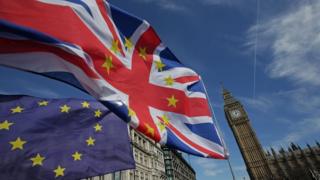
Image copyright
AFP/Getty
The government’s Brexit legislation is on hold as the UK heads towards a general election.
But where do the parties stand on Brexit?
Conservatives – 298 MPs
Prime Minister Boris Johnson wants the UK to leave the European Union (EU) with the revised deal he agreed.
He previously said the UK would leave on 31 October “do or die”.
However, Mr Johnson was forced to write a Brexit extension letter to the EU, after MPs failed to approve a revised deal.
Mr Johnson secured changes to the deal previously negotiated by Theresa May. It includes scrapping the controversial Irish backstop and replacing it with a new customs arrangement.
Image copyright
Getty Images
Boris Johnson’s revised Brexit deal has not yet been approved by the UK Parliament
Brexit left the Conservative Party heavily divided, with 21 MPs expelled recently for failing to follow the government’s line on Brexit. Ten have since been welcomed back.
Labour – 244 MPs
If it wins an election, Labour wants to renegotiate Mr Johnson’s Brexit deal and put it to another public vote.
Labour says its referendum would be a choice between a “credible” Leave option versus Remain.
Under its Leave option, Labour says it will negotiate for the UK to remain in an EU customs union, and retain a “close” single market relationship.
This would allow the UK to continue trading with the EU without checks, but it would prevent it from striking its own trade deals with other countries.
Image copyright
Reuters
If a referendum was held, Mr Corbyn has not said which way he would vote, although he has pledged “to carry out whatever the people decide”.
Other senior figures, including shadow chancellor John McDonnell and shadow foreign secretary Emily Thornberry, have said they favour remaining in the EU.
Just like the Conservatives, Labour has had to deal with internal divisions over its Brexit policy. More than 25 Labour MPs wrote to Mr Corbyn in June, saying another public vote would be “toxic to our bedrock Labour voters”.
SNP – 35 MPs
The SNP is pro-Remain and wants the UK to stay a member of the EU.
It has been campaigning for another referendum on Brexit.
Image copyright
Getty Images
Scotland’s First Minister, Nicola Sturgeon, said the possibility of a no-deal Brexit is “catastrophic”
The SNP’s ultimate objective is for an independent Scotland that is a full member of the EU.
Liberal Democrats – 19 MPs
The Liberal Democrats have pledged to cancel Brexit if they win power at the next general election.
Image copyright
Getty Images
Party leader Jo Swinson says a Lib Dem majority government would cancel Brexit
The policy was endorsed in September by party members at the Lib Dem party conference.
If the Lib Dems do not win a majority at the election they would support another referendum.
Democratic Unionist Party – 10 MPs
The DUP had an agreement with the Conservatives whereby it lent it support in the Commons.
However, while the DUP wants the UK to leave the EU, it is unhappy with the revised deal negotiated by Mr Johnson.
Image copyright
Getty Images
DUP leader Arlene Foster says a solution based on technology could replace the backstop
It’s worried that the union between Northern Ireland and the rest of the UK could be threatened, because Northern Ireland would have to stick to some EU rules and there would be checks on goods coming from Great Britain.
The DUP wanted to be given a veto, so that it had the option to reject the new customs arrangement in the future.
The Independent Group for Change – 5 MPs
This party is made up of MPs who left the Conservatives and Labour, in part because of their positions on Brexit.
They back another referendum, or “People’s Vote”, and want the UK to remain in the EU.
Plaid Cymru – 4 MPs
The party backs remaining in the EU, despite Wales voting “out” in the referendum. It wants a further referendum and to Remain.
Green Party – 1 MP
The party’s one MP, Caroline Lucas, has been a vocal campaigner for another referendum, and believes the UK should stay in the EU.
Brexit Party – 0 MPs
The Brexit Party wants the UK to leave the EU without a deal, in what it calls a “clean-break Brexit”.
It says Mr Johnson’s revised Brexit plan is a bad deal because it would still involve paying the EU a £39bn settlement.
The Brexit Party says it would be willing to form an electoral pact with the Conservatives to try to avoid splitting the leave vote.
Brexit explained
Brexit – British exit – refers to the UK leaving the EU. A public vote was held in June 2016, to decide whether the UK should leave or remain.
Source link



